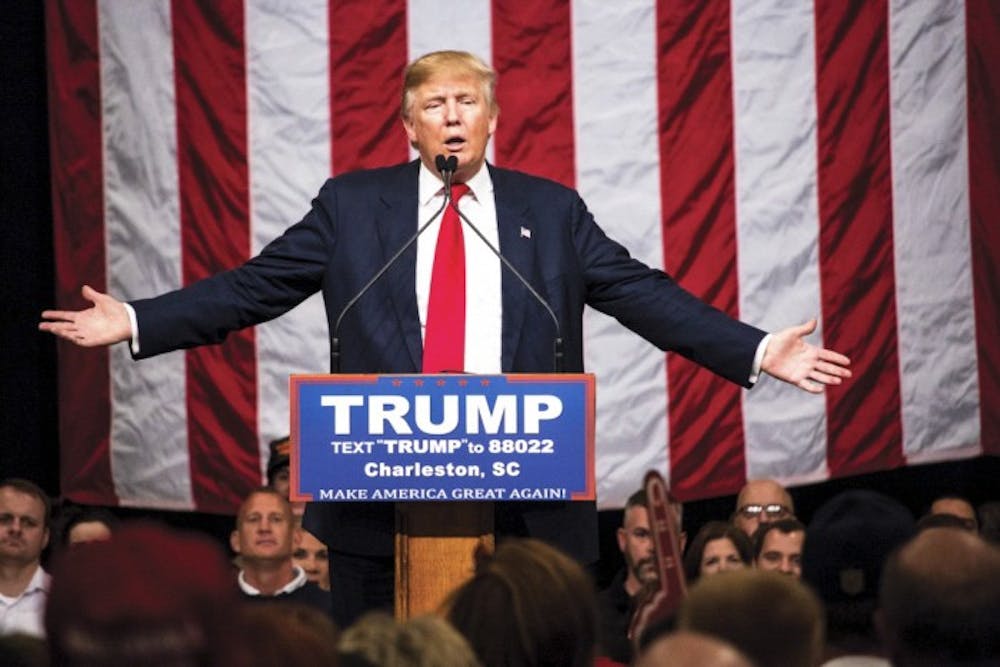
At a Penn reunion for the 1967 graduating class, dozens of alumni protested against classmate and 1968 Wharton graduate Donald Trump, pictured above, urging Penn to "Denounce Trump."
Credit: Julio SosaPenn alumni who returned to campus for a class reunion this weekend took a stand against one of their peers — President Donald Trump.
More than a dozen attendees of the 1967 class reunion and graduation ceremony will wear buttons calling upon Penn to “Denounce Trump,” who graduated from Wharton in 1968.
Penn declined to comment on this story.
Created by 1967 Wharton graduate Michael Sales, the lapel buttons criticized Penn’s ostensible lack of response to a multitude of unproven claims reported about Trump and his alma mater, including the incorrect statement reported by various news outlets that he “graduated first in his class” as a Wharton student in 1968.
“It’s a personal statement,” Sales said. “I think that the University is doing a disservice to itself and to its students and its subsequent reputation by not, at a minimum, correcting the record of lies that Donald Trump has told about his experience at the university.”
While Trump has bragged repeatedly about being a successful student in college, it is not clear if he told news agencies he graduated first in his class. The reports do not quote him making that claim.
Sales added, “Bragging about sexual assault and harassment, ethnic stereotyping, religious bigotry and inciting violence are not acceptable at the University.”
Sales’ journey toward activism began when he created a Facebook page for the Class of 1967 prior to their 45th reunion. Over time, he decided to incorporate both political posts and nostalgic look-backs at the class’ time in campus, using The Daily Pennsylvanian’s online archives.
As Trump’s rise to the presidency began to unsettle the campus, Sales addressed the tense political climate through the Facebook group. He signed a widely circulated online petition calling for Penn President Amy Gutmann and the Board of Trustees to “disavow the intolerant views” of Trump and included political commentary in his Facebook posts to the class page.
“Penn is making a strategic and a moral mistake by not officially disassociating itself from this bully,” he said.
While many of his classmates responded with their own political commentary, some, such as class president, reunion co-chair and 1967 College graduate Howard Freedlander asked his friend and classmate to refrain from politicizing the online page and their upcoming reunion.
Sales, who quit posting to the page after the backlash from the petition, wanted to take a tangible stand against a president who he characterized as stating “anti-intellectual” alternative facts. In hopes of making a visual statement criticizing his alma mater’s response to Trump, Sales ordered 100 lapel buttons in Penn’s colors and began reaching out to classmates asking if they would be interested in joining him in wearing them over the course of their three-day reunion.
When Deborah Pellow, a 1967 College for Women graduate, was contacted by her former classmate, she decided to wear the button as a symbol promoting the values of her undergraduate experience.
“He’s capitalizing on Penn’s name and in no way, shape or form does he represent my understanding of the university,” Pellow said. “The button is a statement in favor of knowledge, reasoning, analysis, news and facts.”
For Lawrence Walsh, a 1967 College graduate who had never even encountered Sales, the decision to wear the button to the reunion dinner was an easy one.
“Wharton has a stake in this and there is a way to counter it [Trump’s statements] without being aggressive and [a] leftwing maniac — roll out what is already a public record,” he said. ” [Instead] a material falsehood was allowed to go through the campaign.”
Although Penn administrators remained quiet about Trump during his campaign, Penn President Amy Gutmann broke her silence at the end of January to criticize the president’s executive order on immigration. This was the first time she had publicly mentioned Trump by name since the start of his presidential campaign.
Even as some classmates have embraced this political symbol, others expressed fears that it could distract from the purpose of the reunion weekend. One member of the class of 1967 decided to not wear the button due to the fear that it “may be divisive.”
Freedlander agreed, expressing worry that the buttons could lead to angry disputes between classmates.
He said while he understands that individuals have intense feelings about the current political climate, he believes that this weekend should be an opportunity to “reconnect, learn and express love for the university.”
In response, wearers of the button say political divisiveness is simply a fact of life under the Trump administration.
“I think that life right now is divisive and to pretend otherwise is stupid,” Pellow said. “I’m not going to walk around chanting, I’m not going to proselytize and I’m not going to tell anybody to join my party.”
“Penn was very, very important to me, in my coming of age basically. I learned a lot, I met a lot of interesting people, and it was a good education... and I think that therefore stands for something,” she added. “If Trump were quiet about his background it would be one thing, [but instead] he brags about having graduated from Penn – well, then what did he learn there?”
The Daily Pennsylvanian is an independent, student-run newspaper. Please consider making a donation to support the coverage that shapes the University. Your generosity ensures a future of strong journalism at Penn.
Donate







